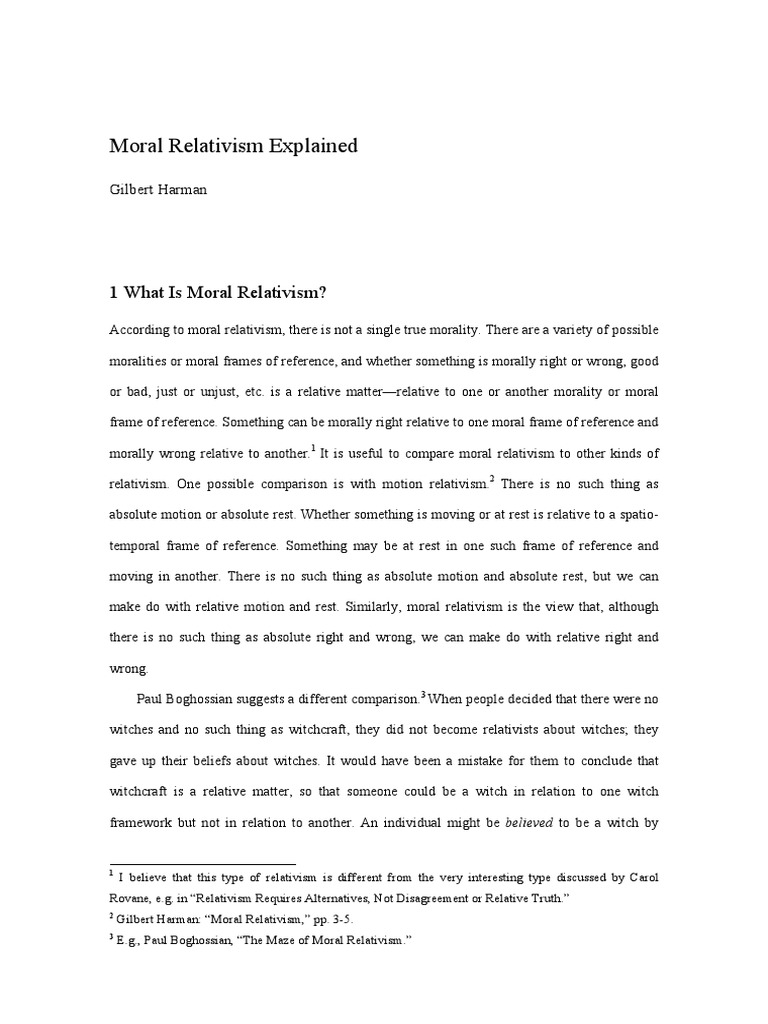Moral relativism presents a compelling framework through which to comprehend the myriad complexities underpinning human ethics. This concept suggests that moral judgments and ethical standards are not universally applicable but are culturally bound and contextually sensitive. At its core, moral relativism challenges the notion of absolute truths, urging individuals to reconsider their moral assertions in light of diverse cultural paradigms. By analyzing its foundational components, one can cultivate a nuanced comprehension of moral relativism, subsequently fostering a profound shift in perspective regarding ethical discourse.
The first component that merits exploration is the concept of cultural relativity. This principle posits that moral beliefs and values are intrinsically tied to cultural contexts. Different societies embody unique moral frameworks shaped by historical developments, social structures, and environmental factors. For instance, in some cultures, collectivism is revered, whereas, in others, individualism is paramount. Such variations incite discussions surrounding the legitimacy of moral judgments across cultures, reminding us that what is deemed acceptable in one society may be condemned in another.
Furthermore, the principle of empathy plays a pivotal role in moral relativism. To genuinely grasp the intricacies of another culture’s moral stance necessitates a willingness to engage in empathetic understanding. This cognitive process amplifies the importance of perspective-taking, allowing individuals to inhabit the moral universe of others. By doing so, one transcends ethnocentric biases that might cloud judgment and ignite conflict. Empathy fosters an environment for dialogue and compromise, critical for addressing contemporary global issues.
Another essential component of moral relativism is the notion of moral pluralism. Moral pluralism acknowledges the existence of multiple, often conflicting moral systems without falling into the trap of nihilism—the belief that life is without objective meaning. Instead, it promotes a rich tapestry of moral thought, where diverse ethical frameworks coexist. This multiplicity of morals invites individuals to engage with alternative ethical systems, stimulating curiosity and challenging preconceived notions of right and wrong.
The role of contextual factors cannot be overlooked either. Moral relativism emphasizes that ethical judgments often hinge upon situational variables rather than absolute principles. Contextualism argues that the moral weight of an action can vary dramatically based on circumstances. For instance, lying may be morally reprehensible, yet it could be justified in scenarios such as protecting someone from harm. Such contextual nuances compel one to scrutinize moral prescriptions critically and recognize their limitations.
Moreover, the significance of historical perspectives shapes moral relativism profoundly. Ethical beliefs are not static; they evolve with the passage of time. What was once considered morally acceptable—such as slavery or gender inequality—has often been recontextualized through evolving societal norms and values. Understanding the historical trajectory of moral thought allows individuals to appreciate the fluidity of ethics and underscores the necessity of adaptable moral frameworks in a rapidly changing world.
Transnational dialogues also embody an influential component of moral relativism. As globalization fosters interconnectedness among diverse cultures, the exchange of ethical ideas prompts reconsideration of fixed moral paradigms. Cross-cultural interactions expose individuals to different moral reasoning and encourage discourse that can lead to enriched ethical understanding. This intercultural engagement not only piques curiosity but also builds solidarity in addressing issues that transcend borders, such as climate change and social justice.
Furthermore, the disaggregation of moral authority complements the tenets of moral relativism. In traditional ethical frameworks, moral authorities—such as religious texts or philosophical doctrines—often dictate principles of right and wrong. However, moral relativism suggests that moral authority can be decentralized. Individuals possess the agency to discern and formulate their ethical beliefs based on personal experiences and societal influences rather than rigid doctrines. This assertion of moral autonomy empowers individuals to navigate complex moral landscapes and encourages personal growth.
Critics of moral relativism often argue that it leads to moral permissiveness or a dismissal of ethical standards altogether. However, proponents contend that acknowledging the relativity of morals does not equate to moral nihilism. Rather, it invites a more profound examination of ethical dilemmas, prompting the pursuit of consensus and understanding amid diversity. Engaging in these discussions fosters a richer tapestry of moral understanding while remaining sensitive to the unique values of different cultures.
As one delves deeper into moral relativism, it becomes evident that this perspective is not merely an academic exercise; it has practical implications for contemporary global challenges. Issues such as climate change, human rights, and economic disparity require a collaborative approach grounded in mutual respect for diverse ethical frameworks. Embracing moral relativism can illuminate pathways toward alliance building across cultures, ultimately fostering collective action for shared global issues.
In conclusion, moral relativism, with its components of cultural relativity, empathy, moral pluralism, context sensitivity, historical perspectives, transnational dialogues, and the disaggregation of moral authority, urges a profound shift in ethical thought. It poses essential questions about the universality of morals, giving rise to an ethos that celebrates diversity in moral reasoning while promoting curiosity and understanding. As we navigate an increasingly interconnected world, embracing the nuances of moral relativism may ultimately equip individuals and societies to approach ethical dilemmas with openness and compassion.
